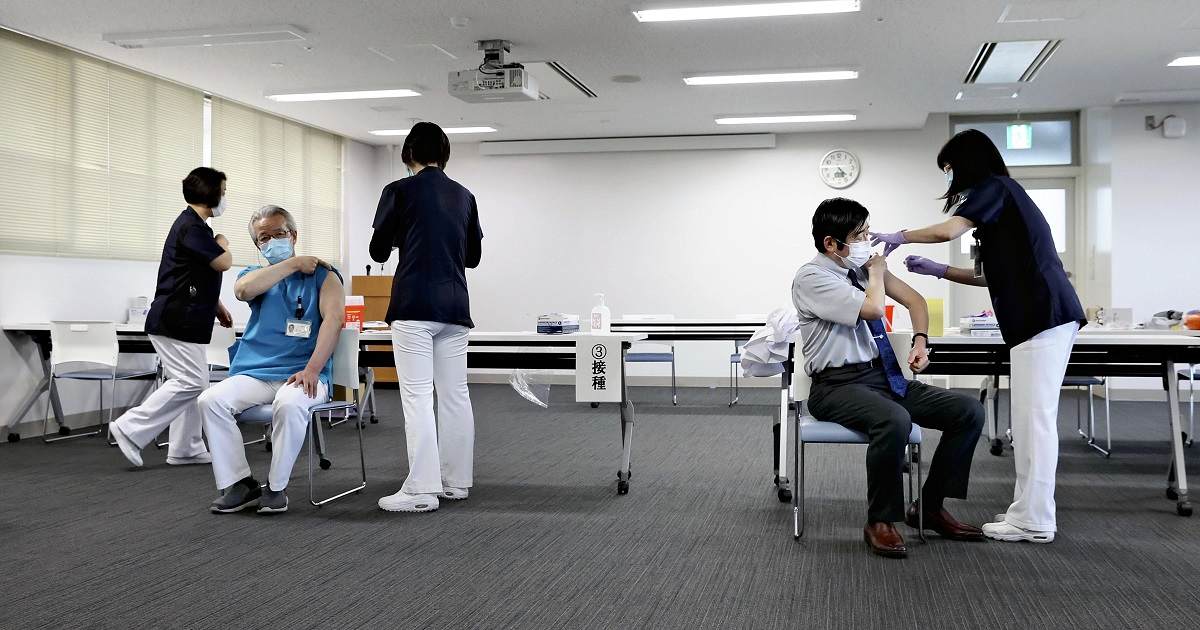
Medical workers receive COVID-19 vaccinations in Ichihara, Chiba Prefecture, on Feb. 17.
9:28 JST, February 24, 2021

The first doses of a vaccination against COVID-19, the disease caused by the novel coronavirus, were given to medical workers starting on Feb. 17 at select hospitals around the nation.
Vaccinations of the elderly and other members of the general public could start from April or later. Medical institutions, where there is a constant fear of hospital bed shortages, and nursing homes have expressed their hopes that the vaccines will be a big step forward to putting an end to the pandemic.
Always exposed to risk
“I hear that the risk of developing the disease has decreased in other countries where vaccinations already started. I hope the vaccines will change the course of the current situation in Japan in the right direction,” said a female employee of the National Hospital Organization’s Tokyo Medical Center in Meguro Ward, Tokyo, on Feb. 17, after receiving a vaccination at the hospital.
About 800 people working at the hospital are expecting to receive vaccinations. Apparently, those working in the same department will get their shots on different dates so that vaccinations won’t affect daily routines at the hospital, such as examinations by doctors, surgeries and medical tests.
“We are always exposed to the risk of hospital-acquired infections,” said Kazuhiro Araki, the head of the hospital. “Vaccinations will give us a sense of security.”
Hospital beds full
After the first vaccinations, which will cover about 40,000 front-line medical workers, other medical staff will get priority to receive the shots.
“I hope vaccinations will help decrease the number of hospitalized COVID-19 patients, even by a small number,” said Takahiro Okai, 58, deputy head of Kawakita General Hospital in Suginami Ward, Tokyo, which has accepted a total of about 600 people who contracted the virus since March last year.
Around the year-end and the New Year holidays, when the outbreak surged, the hospital’s 36 beds set aside for COVID-19 patients were filled.
Doctors and nurses strained to work with extreme caution so that they would not carry the virus out from the ward exclusively for COVID-19. In doing so, they had to endure a situation that was tough mentally as well as physically because of the increase in elderly patients, who need assistance with eating and bodily functions.
Since mid-January, the hospital boosted the number of beds in the ward by seven at the request of the Tokyo metropolitan government. At around the same time, however, 81 people, including hospital staff and patients, tested positive for the virus, thereby forcing the hospital to stop accepting new inpatients and emergency outpatients. Acceptance resumed Feb. 15, but the beds for COVID-19 patients remain full.
Psychological burdens
From April or later, vaccinations could start to be given to those age 65 and older, workers at nursing care facilities for the aged, as well as people with underlying health issues.
“If not only our residents but also our staff members can get vaccinations, then that will probably ease some of their psychological burden,” said Yoshito Hayashi, 58, the director of Riverside Green, a nursing home for elderly people requiring special care in Edogawa Ward, Tokyo.
The facility is home to 50 residents in their 70s to 100s, who are looked after by about 20 staff members. Because the elderly are more susceptible to developing serious symptoms once they become infected with the virus, staff members have been taking utmost care since April last year, measuring their temperatures at home as well as at work, and refraining from dining out.
Still, in January a staff member was found to be infected, although the residents the staff member cared for tested negative for the virus.
“In the past year, we’ve been on alert day after day, thinking that there will be irreparable damage if a resident becomes infected,” Hayashi said. “I presume that even if an infection were to occur, the vaccine will prevent the development of serious symptoms.”
Top Articles in Society
-

Man Infected with Measles Reportedly Dined at Restaurant in Tokyo Station
-

Man Infected with Measles May Have Come in Contact with Many People in Tokyo, Went to Store, Restaurant Around When Symptoms Emerged
-

Woman with Measles Visited Hospital in Tokyo Multiple Times Before Being Diagnosed with Disease
-

Australian Woman Dies After Mishap on Ski Lift in Nagano Prefecture
-

Foreign Snowboarder in Serious Condition After Hanging in Midair from Chairlift in Nagano Prefecture
JN ACCESS RANKING
-

Japan PM Takaichi’s Cabinet Resigns en Masse
-

Japan Institute to Use Domestic Commercial Optical Lattice Clock to Set Japan Standard Time
-

Israeli Ambassador to Japan Speaks about Japan’s Role in the Reconstruction of Gaza
-

Man Infected with Measles Reportedly Dined at Restaurant in Tokyo Station
-

Videos Plagiarized, Reposted with False Subtitles Claiming ‘Ryukyu Belongs to China’; Anti-China False Information Also Posted in Japan























